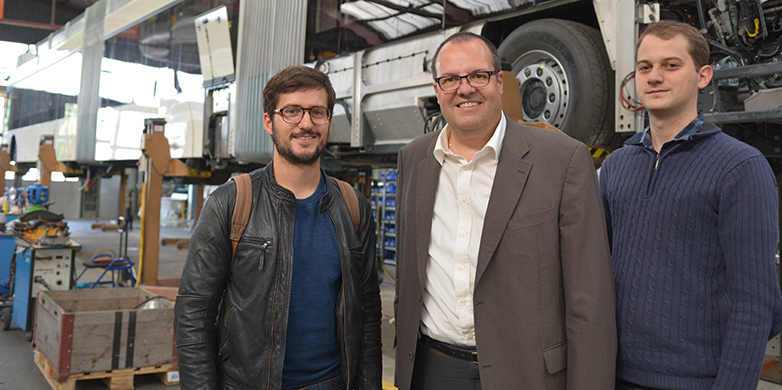ETH team awarded prize for energy management system
Today, the Swiss Federal Office of Energy (SFOE) is presenting the Watt d’Or energy prize in the Energy-efficient mobility category to the Institute for Dynamic Systems and Control. This award is in recognition of the technology the institute has developed in collaboration with Carrosserie Hess AG.
The Institute for Dynamic Systems and Control (IDSC) in the Department of Mechanical and Process Engineering at ETH Zurich has been awarded the Swiss external page Watt d’Or energy prize, which it is receiving jointly with Carrosserie Hess AG. The prize is in recognition of the Advanced Hybrid Electric Autobus Design (AHEAD) technology developed by the institute and its industry partner, which allows designing buses for optimum energy efficiency and cost-effectiveness.
The energy that drives the diesel-electric hybrid buses manufactured by Carrosserie Hess AG is provided either by a diesel generator or by a supercapacitor. Energy recovered during braking is stored and subsequently reused as required, which makes these buses much more energy-efficient than conventional diesel-powered buses. As part of its efforts to continuously improve the cost-effectiveness, efficiency and handling of its buses, the company joined forces with researchers from ETH Zurich and together they have come up with the successful AHEAD technology.
AHEAD is an energy management system that IDSC has been developing for the past five years. It acts as a “brain” for the overall system, processing both GPS data and route information such as elevation profiles or the distance to the next stop to ensure that the diesel engine and the supercapacitor in the powertrain always run as efficiently as possible.
Fuel consumption reduced by 25%
“With this energy management system, which ‘learns’ the route a bus needs to take, we can save around 25 per cent of the fuel required by a conventional diesel-fuelled bus,” said Philipp Elbert from IDSC.
Christopher Onder, Professor of Engine Systems at ETH Zurich, believes that the close contact between the university and Swiss industrial enterprises such as Carrosserie Hess AG is extremely important for ETH: “This kind of cooperation enables us to put the latest scientific findings into practice.”
This sentiment is echoed by Hans-Jörg Gisler, the man in charge of technology at Carrosserie Hess AG, who sees the company’s cooperation with ETH Zurich as a powerful and important catalyst for a project like this: “As an SME, fostering innovation is not something we can do alone. These partnerships give us a clear advantage when it comes to tackling the future of mobility.”
A hybrid bus equipped with an AHEAD system has been running on a public transport route in the German town of Heidenheim on a trial basis since September 2013. In a few years’ time, buses with AHEAD systems could be rolled out in Switzerland too.
A fourth Watt d’Or for IDSC
Today’s Watt d’Or award ceremony marks the ninth time that this prize has been presented at the Federal Office of Energy’s New Year event. It is awarded for outstanding energy projects, impressive concepts and innovations. Winners are chosen in five different categories: Society, Energy technologies, systems and appliances, Renewable energy, Energy-efficient mobility and Buildings and space. This year the judges are also awarding a special prize for education. The Watt d’Or does not come with any prize money and it does not produce any rankings of the winners.
This latest accolade is the fourth Watt d’Or to be awarded to IDSC, which is headed up by ETH President Lino Guzzella and Professor D’Andrea. The institute previously won the energy prize in 2007 (for the Pac-Car II project), 2010 (for a pneumatic hybrid engine) and 2014 (for a natural gas-diesel hybrid engine).

Comments
No comments yet